Educator-to-Educator Tips & Strategies
Find out how your peers are making the most of Aquifer cases and teaching tools.
Find out how your peers are making the most of Aquifer cases and teaching tools.
Effective communication in clinical practice is vital f … Read more
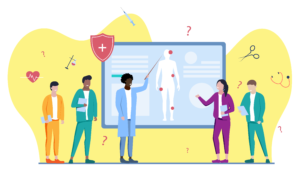
By: Youngjin Cho, Ph.D. (1), Jess Cunnick, Ph.D. (1), B … Read more
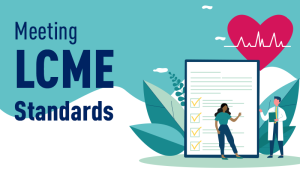
Students provide consistently high rankings for Aquifer as reported in our five-star rating feedback data, but how and when cases are integrated into the curriculum can have a significant impact on their learning. Find out what themes emerged when we ask students what methods are most effective–and discover practical tips for assigning Aquifer cases based on student feedback.

Students provide consistently high rankings for Aquifer as reported in our five-star rating feedback data, but how and when cases are integrated into the curriculum can have a significant impact on their learning. Find out what themes emerged when we ask students what methods are most effective–and discover practical tips for assigning Aquifer cases based on student feedback.

At Florida Atlantic University Charles E. Schmidt College of Medicine, we are supporting our fourth-year students with flexible online elective rotations by adapting the model we created during COVID. Our virtual asynchronous electives–built with Aquifer cases and WISE-MD modules and implemented on the fly during lockdown–proved valuable to students, earning positive feedback and course reviews. With a few minor modifications, we are continuing this offering in response to student requests and the wide range of time-consuming requirements in the fourth year.

WISE-OnCall is used by programs across medical and health professions education to help learners diagnose and manage clinical situations they are likely to encounter on clinical clerkships, advanced sub-internships, and during the transition to residency or practice. Here are some successful integration strategies that we’ve heard from faculty users…

At Florida Atlantic University Charles E. Schmidt College of Medicine, we are supporting our fourth-year students with flexible online elective rotations by adapting the model we created during COVID. Our virtual asynchronous electives–built with Aquifer cases and WISE-MD modules and implemented on the fly during lockdown–proved valuable to students, earning positive feedback and course reviews. With a few minor modifications, we are continuing this offering in response to student requests and the wide range of time-consuming requirements in the fourth year.

Aquifer High Value Care, a free course available to all … Read more

WISE-OnCall is used by programs across medical and health professions education to help learners diagnose and manage clinical situations they are likely to encounter on clinical clerkships, advanced sub-internships, and during the transition to residency or practice. Here are some successful integration strategies that we’ve heard from faculty users…

We all know that every student will have a slightly different experience in each of their supervised clinical practice experiences (SCPEs). At our program, we’ve been using Aquifer cases to augment learning, build key communication skills, and supplement clinical experiences to meet ARC-PA standards.

We all know that every student will have a slightly different experience in each of their supervised clinical practice experiences (SCPEs). At our program, we’ve been using Aquifer cases to augment learning, build key communication skills, and supplement clinical experiences to meet ARC-PA standards.

WISE-OnCall is used by programs across medical and health professions education to help learners diagnose and manage clinical situations they are likely to encounter on clinical clerkships, advanced sub-internships, and during the transition to residency or practice. Here are some successful integration strategies that we’ve heard from faculty users…

WISE-OnCall is used by programs across medical and health professions education to help learners diagnose and manage clinical situations they are likely to encounter on clinical clerkships, advanced sub-internships, and during the transition to residency or practice. Here are some successful integration strategies that we’ve heard from faculty users…
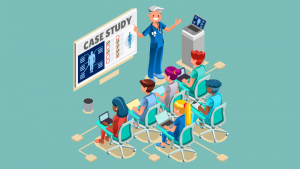
Whether you’re searching for ways to engage students in virtual learning, revamping a stale lecture, or building a new didactic session, flipping the classroom around Aquifer cases is a powerful way to engage your students and help case-based learning stick. Check out different ways that medical educators are integrating Aquifer cases into their pedagogy…
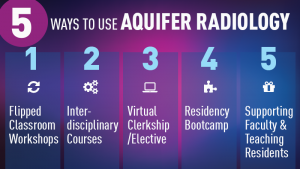
The 19 cases in Aquifer Radiology are designed to meet the needs of a wide range of learners and fit into many teaching modalities. Top radiology educators presented their successful strategies for integrating the cases in our recent webinar–find out what they shared…
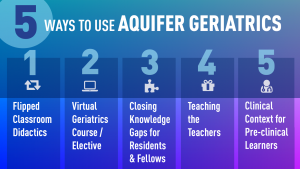
The 27 cases in Aquifer Geriatrics are designed to meet the needs of a wide range of learners and fit into many teaching modalities. Top geriatrics educators from around the country presented their successful strategies for integrating the cases in our recent webinar–find out what they shared…
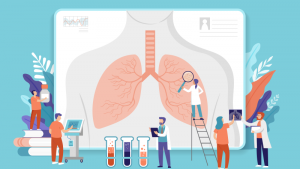
Diagnostic errors are a major source of morbidity and mortality in health care, and there is increasing focus on reducing diagnostic errors in medicine. Fitting these topics into your curriculum can be challenging. To help, I’d like to highlight strategies that educators have found successful using the cases and teaching tools included in Aquifer Diagnostic Excellence.

As the pandemic caused widespread disruption, Aquifer saw an unprecedented jump in the use of our cases–and many innovative ways to use the cases across curricula. Through our grant applications and many ongoing conversations with educators, we were able to identify trends and challenges and gather success stories and strategies to share.

In our Longitudinal Integrated Clerkship, students transitioned patient-based clinical learning from real patient to Aquifer cases in late March. These more advanced level clerks required that virtual cases have increased complexity to adequately challenge them and continue building their clinical skills. In order to meet these learning demands, Aquifer cases were introduced as written and then modified in preceptor lead discussions to encourage further clinical reasoning skill development.
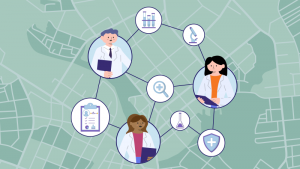
Our community faculty are busy clinicians in local health systems or private practice. At several points throughout the clerkship, we provide calendars with the didactic and Aquifer case schedule illustrating the clinical information students will cover on campus. We actively encourage preceptors to engage in discussion with their students about what was covered during these activities outside of their offices to the benefit of both students and preceptors.

In many Aquifer cases, students are asked to write out a one to three sentence summary statement that mimics the communication skills they need on rounds, calling consults, and writing patient progress notes. Reviewing a selection of these statements provides an opportunity for faculty to provide meaningful, targeted feedback on clinical reasoning skills.
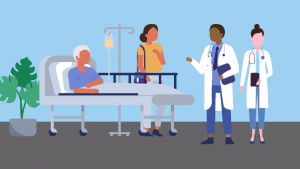
Medical schools have always worked hard to provide fourth-year students with clinical knowledge. But far less time is dedicated to effective, delicately nuanced conversations about diagnoses and prognoses with patients and their families. This gap isn’t new, but it’s being exacerbated by the pandemic. In response, we created an online elective dedicated entirely to learning, thinking about, and practicing these difficult communication skills.

Students provide consistently high rankings for Aquifer as reported in our five-star rating feedback data, but how and when cases are integrated into the curriculum can have a significant impact on their learning. Find out what themes emerged when we ask students what methods are most effective–and discover practical tips for assigning Aquifer cases based on student feedback.

Like everyone else, our school needed to develop alternatives for our new fourth-year students due to the COVID-19 pandemic. With an uncertain return date for students at a range of clinical sites, we decided to build virtual, asynchronous electives that would help prepare students for their clinical rotations, and especially their Acting Internships. We leveraged a range of case-based online modules to cover different disciplines, including Aquifer and WISE.

For those of us using virtual education time to prep students for eventual return to clinical settings, using an Aquifer case as a framework for an interactive orientation or hospital operations training session will better prepare students and interns to hit the ground running and take full advantage of rotations which, in many cases, have been shortened in duration.

Aquifer cases can form the basis for a huge variety of classroom sessions that can be easily adapted for virtual learning. Here are some ideas to spark your creativity if you are designing your own activity. Suggested strategies include…

It may seem unusual to design and implement a medical student course focused on high-value care in the middle of a pandemic. As third and fourth-year medical students were pulled from clinical duties at the urging of the AAMC, educators at the University of Virginia School of Medicine developed a two-week online course. The course introduced students to an integrative, comprehensive model of high-value care applicable to future clinical practice.

Many educators are wondering how to meaningfully engage their students in distance learning activities that create community and allow them to practice important patient care skills (while not seeing patients). While I have been doing peer-to-peer consults with educators around the country about using Aquifer cases in their curriculum, I stumbled into a helpful reframe that seems to be unlocking people’s creativity: Aquifer cases (yep…more than 170 of them!) are virtual standardized patients. Wait…what?